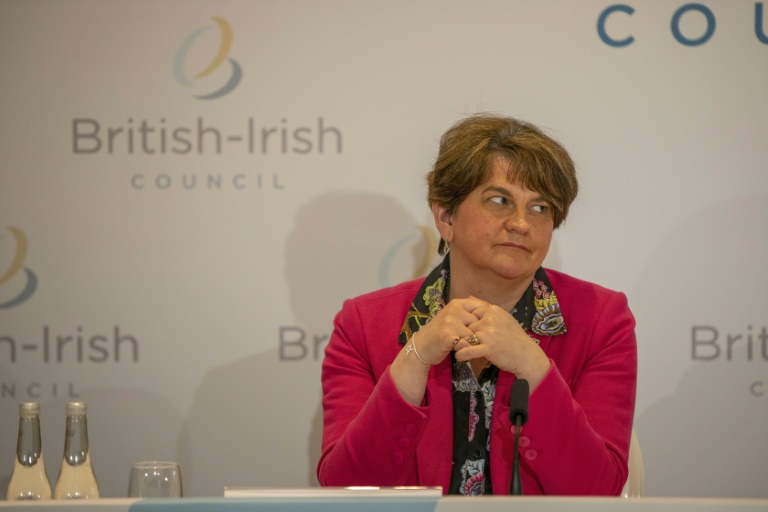Arlene Foster formally stepped down as Northern Ireland’s first minister on Monday, bringing further instability to the British-ruled province where tempers are already frayed over post-Brexit trading arrangements.
The Democratic Unionist Party (DUP) politician called for cool heads to prevail but warned that the “Northern Ireland protocol” has seeded dangerous discontent.
“Politics in Northern Ireland, between the UK and Ireland, and the UK and the EU, is out of balance, an imbalance created by the protocol,” she told lawmakers in the regional assembly at Stormont.
She said the protocol — which since the start of 2021 has effectively kept Northern Ireland in the EU customs union and single market for goods — “is not a real partnership”.
“An imbalance and an instability is built in, that will fester and deteriorate,” she warned.
“Imbalance and instability in the context of Northern Ireland is a truly dangerous cocktail.”
– Fears of unrest –
In early April, Northern Ireland — divided between pro-UK unionists and pro-Ireland nationalists — saw a week of rioting fuelled by anger over the protocol.
At least 88 police officers were injured in scenes reminiscent of “The Troubles”, the sectarian conflict over British rule of Northern Ireland, which ended in 1998.
There are fears unrest will reignite over the summer months, a traditional time of disruption in the province marked by hardline unionist marches.
Europe has already threatened London with reprisals if it extends a grace period on checks on chilled meat products, in a row that overshadowed last weekend’s G7 talks.
UK Prime Minister Boris Johnson has said he will do “whatever it takes” to protect UK territorial integrity, calling on Brussels to take into account the complexities and fragile peace in Northern Ireland.
– Parting shots –
As first minister and DUP leader Foster, 50, vehemently opposed the Northern Ireland protocol, which enforces checks on goods arriving from mainland Britain to prevent them entering the EU by the backdoor via EU member Ireland.
But she was powerless to prevent Johnson imposing it.
In April she was forced to announce her resignation by DUP colleagues who felt she took a soft stance against the new arrangements, which many unionists feel have driven a wedge between Northern Ireland and the rest of the UK.
Under terms of a power-sharing deal, Foster’s resignation will see deputy first minister Michelle O’Neill, of pro-Ireland Sinn Fein, also step down.
Both parties now have seven days to agree who will step back in to fill the leadership roles.
The DUP have selected regional lawmaker Paul Givan — a Brexit hardliner — as their pick to replace Foster.
But if the parties cannot agree to rule in tandem, a snap election will be called.
There have been early signs that negotiations to replace Foster may be fraught by a long-running standoff over government provisions for Irish language speakers.
Edwin Poots — another Brexit hardliner who has replaced Foster as DUP leader — said Northern Ireland “is at a very tense situation” following the riots in April.
If Sinn Fein do not nominate a deputy first minister “we are putting our very peace at risk,” he added.
– In denial –
In her departure speech Foster — who has endured sour relations with Poots — urged against “frivolous brinkmanship”.
“It is only by respecting each others identity that we will move forward,” she said.
In a further parting shot against the protocol, Foster echoed Johnson’s message to European leaders, saying: “Northern Ireland is part of the United Kingdom and needs to be treated as such.
“If the EU does not, then the UK will have a practical, political and moral obligation to act to protect the everyday life of everyone in Northern Ireland.
“If Brussels continued to think that the protocol is enough, they are in denial… Over and out.”










